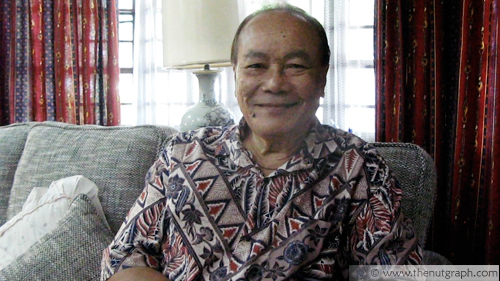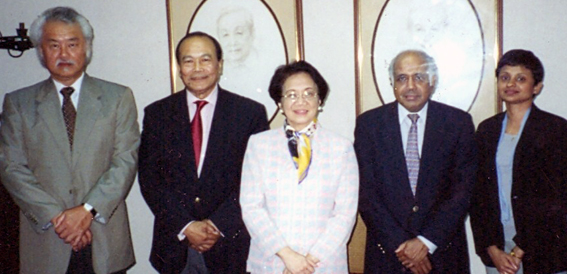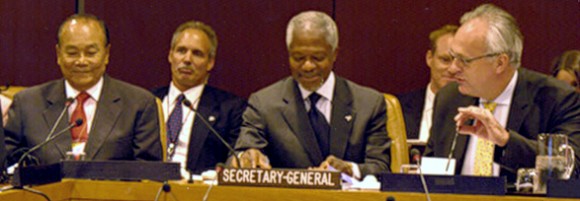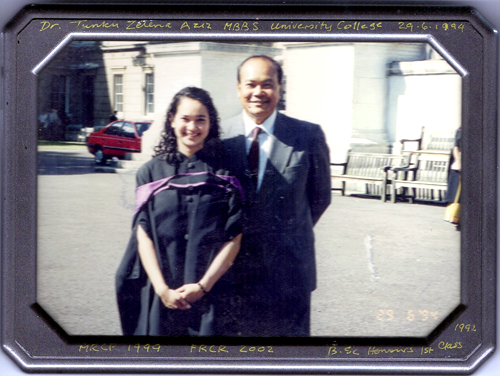By Koh Lay Chin | The Nut Graph

Tunku Aziz (all pics below courtesy of Tunku Aziz)
BEFORE Senator Tunku Abdul Aziz Ibrahim became a politician, he was far better known as a Malaysian champion of transparency, integrity and good governance. Indeed, it was no coincidence that Tunku Aziz, together with like-minded individuals, founded Transparency International Malaysia (
TI-Malaysia) in 1998. He was TI-Malaysia president until December 2004.
Even after setting up TI-Malaysia, the former Bank Negara advisor actively promoted ethics and good governance at both the regional and international level. This included work within the World Bank and the United Nations. It was in his capacity as special advisor to the UN secretary-general, a post he was appointed to in 2006, that he set up the
UN Ethics Office.
He returned from New York on completion of this work in 2007, and in 2008 joined
DAP, a party he had been monitoring for the past 20 years “without their knowledge”. He is currently DAP national vice-chairperson, and was appointed as the first DAP
senator in July 2009.
In this 1 June 2010 interview with
The Nut Graph at his Kuala Lumpur home, Tunku Aziz talks about his royal Hindu ancestry and what it was like living in the days before and after independence.
TNG: Where were you born, and what were your earliest childhood memories?
Tunku Aziz: I was born in Alor Star in 1934. My father was an officer in the Kedah state police. My earliest memories were of the parades that were held frequently, accompanied by the Kedah state police band. I suppose that was how I have come to love military music and brass bands.
We were literally surrounded by police families when I was born. Those days in Kedah, there were two avenues for young men — the Kedah civil service and the Kedah state police. My father’s elder brother opted for the civil service, and my father became a police officer.
There was a lot of freedom to play with friends of all races. There was no homework in the lower classes, and no big school bag to lug around. My childhood memories are filled with going swimming in the river at Gurun and Kulim without telling my mother. Things like that. [But] my mother always knew if I had been swimming because my red eyes gave me away.
Can you trace your ancestry?
My family history goes back several hundred years. We can trace our origins from the days of the Hindu kingdom. My ancestors were Hindu before they became Muslim. I descended from the line of Sultan Abdullah, who had two sons, Sultan Ahmad Shah and Tunku Yaakob, also known as Tunku Embong. He, being the younger, became the Raja Muda. In short, that is my family tree.
As I have indicated, the present Kedah ruler can trace his lineage back to the first Hindu king of Kedah. It is the country’s oldest royal line. My mother was a dayang from Brunei whose elder sister married my father’s elder bother — two brothers marrying two sisters.

With the late Corazon Aquino, former president of the Philippines, circa 2000, in his capacity as TI-Malaysia president
Probably the most important advice that my father gave to me went something like this. That it is no use driving a big, expensive car if people in the coffee shops are going to say, as you drive by, “Look at that [person] driving a big car. He [or she] is on the take.”
That made a strong impression on me, because this is where self worth comes into the picture. And if you have no self respect to begin with, you have no respect for other people. This is why I have always tried to resist any temptation to take a bribe, knowing full well that I would never be able to live with myself.
[My father] was a stickler for rules. I remember as an 11-year-old, [I] had my own [football] team that played matches in kampongs some four or five miles away. He would always remind me to ensure that when I cycled home in the evening, my bicycle had a light. Followed by, “If you are caught riding without a lamp, don’t claim that you are the son of the OCPD.” He was then the Alor Star OCPD!
How do you connect with these stories as a Malaysian?
I come from the state of Kedah, which was an independent country before it became a protected state of the British empire. The people of Kedah ran their own affairs and there was a sense of confidence. Unlike [Malay Malaysians] in the other parts, except for Johor, who were virtually under British control and domination. I think when you have confidence in your ability to deal with people, then you don’t worry too much about the ethnicity of the other person.
Having grown up with Chinese [Malaysian] and Indian [Malaysian] friends in particular, it never occurred to me that they were to be treated differently. They were just my friends.
In Kedah, although it was a Malay state, there was no discrimination, although the Kedah civil service and the officer ranks of the Kedah state police were open only to educated boys from “good Malay” families. I remember when I was growing up, the state treasurer was a highly respected Chinese [Malaysian]. I grew up used to people of all races living and working together.
I have always believed that we are one people, the strength of our country is derived from our diversity. And I have always maintained long before (Prime Minister Datuk Seri) Najib (Razak) that tolerance was not good enough. Because it suggests our making small concessions that people are prepared to make, grudgingly. Acceptance of our cultural differences, on the other hand, that is really the key to a united Malaysian nation.

Tunku Aziz with Kofi Anan in New York, 2006, when he was special advisor to UN secretary-general
I feel a sense of responsibility as a Malaysian. That although I am not close to the throne, I carry the family title, and that means a great deal to me. Not to let the family down, and I supposem to protect the good name of the bigger family of Kedah.
I do my best and I am conscious of the fact there is a long history behind us of providing leadership. For a long time, I have been concerned with polarisation which is very much in evidence. I feel that unless we change the way we look at the issues of culture and race, Malaysia will continue to be plagued by all kinds of problems which will really [distract us] from developing the country to its fullest potential.
For that reason, I made up my mind, against my better judgement, to be in politics. I have no regrets. I thought it was all very well and good to stand on the sidelines and comment on the country’s state of affairs. But if I wanted to help make a difference to national unity and development, then I had to be prepared to stand up and be counted.
I have always been opposed to race-based politics because when you focus on your own race, then you are consciously or unconsciously setting yourself apart. The attitude you adopt is not one of inclusiveness but exclusiveness. So I looked for a party that met my hopes and aspirations and found the DAP fitted the bill.

Tunku Aziz with his daughters at their home in 1983
I can explain this. [Tun]
Ismail Ali was my governor at the central bank. I was persuaded to join [Bank Negara] because I was inspired by his attitude towards his race. But more important, towards his nation as a whole.
He wanted the best for his race, but that wasn’t ketuanan Melayu or Malay supremacy. It was to make Malays self-sufficient, strive for the best, be less dependent on government support and subsidies. Most of all, he wanted something for all Malaysians, and that was equality of opportunity.
For example, when I was Bank Negara’s appointments committee head, both he and I felt that we should always go for the best talent. He recognised Malay [Malaysians] had not yet reached that level, but given the time and right opportunity, they would rise to the occasion.
I remember one year when I appointed 22 young economists who were Chinese [Malaysians]. One person said, “Tunku, do you know that there is this thing called the
NEP?” I said I was well aware of that policy but if we wanted the best people to serve the bank then we would have to take the best candidates, irrespective of race, creed or colour.
And I asked him whether he understood Bank Negara’s principles and functions. He hesitated. I then told him its function was to give the best possible independent monetary and financial advice to the Malaysian government. What sort of advice would we be giving if we did not recruit the right people? If I had to scrape the bottom for advisors, then that advice would not amount to much.
What are your hopes for Malaysia?
After more than 50 years of Independence, we have come to the end of the line, as far as Umno-dominated policies are concerned. Those policies have been adopted and noted more for their divisiveness rather than cohesiveness, because most of these policies have elements of discrimination.
Obviously, we need a change and this can only come about if a new set of people with progressive ideas; people who are convinced the country’s future must be in the hands of all citizens. The policies which have failed us should be abandoned. I am hopeful that left to themselves, the people know what they need and what is good for them.

Tunku Aziz with his daughter Dr Tunku Zelena Aziz during her graduation in 1994 in England
Our aspirations are similar in that we want a peaceful future, equal opportunities for our children and grandchildren. We must provide these opportunities. They need to feel that their country belongs to them, and that they can claim ownership without feeling marginalised, sidelined and discriminated against. Loyalty does not mean my country, right or wrong. It means I am prepared to work and make sacrifices because this is my country, my motherland.



 Felda bureau chairman Suhaimi Said told The Malaysian Insider the party has been busy organising meetings with settlers and forming party branches, turning Felda settlements into a battlefront for the next general election.
Felda bureau chairman Suhaimi Said told The Malaysian Insider the party has been busy organising meetings with settlers and forming party branches, turning Felda settlements into a battlefront for the next general election.










 Uthayakumar has been the leading advocate of those who have died in police custody in recent years.
Uthayakumar has been the leading advocate of those who have died in police custody in recent years.











